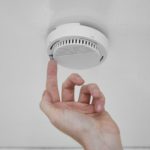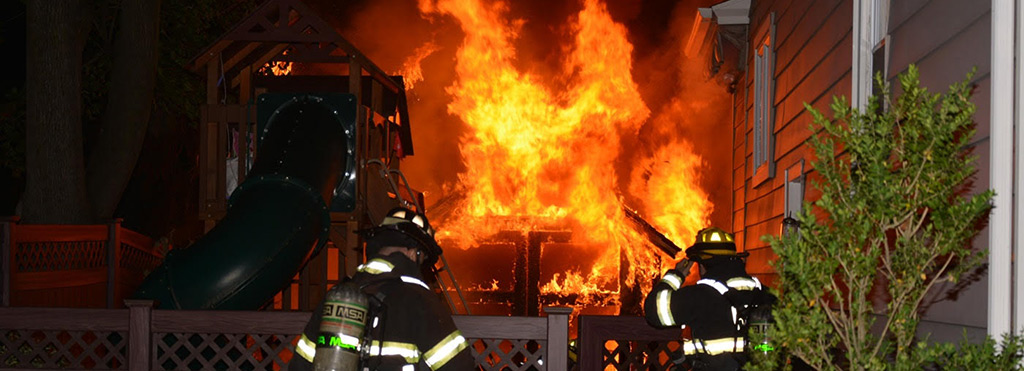WHAT YOU CAN DO TO PREVENT A FIRE
Install smoke detectors outside each separate sleeping area and on every floor of your home, including the basement.

- Working smoke detectors can reduce the risk of death in a residential fire by 40-50%.
- The best smoke detectors are those with lithium-powered batteries and hush buttons. A lithium-powered battery can last up to 10 years, and a hush button allows you to quickly stop nuisance alarms that are caused by oven smoke, burnt toast, prolonged cooking, etc.
- If 10-year, long-life smoke detectors are not available, install smoke detectors that use regular batteries, preferably alkaline, and replace the batteries as necessary – and at least once a year. (A useful tip to help you remember: in the fall, when you change your clocks to standard time, change your batteries as well!)
- Test smoke detectors every month to make sure they are in proper working condition.
Prevent a fire from starting or spreading in your home.

- The most common causes of residential fires are careless cooking and faulty heating equipment. When cooking, never leave food on a stove or in an oven unattended. Avoid wearing clothes with long, loose-fitting sleeves. Have your heating system checked annually, and follow manufacturer’s instructions when using portable heaters.
- Smoking is the leading cause of fire deaths and the second most common cause of residential fires. If you are a smoker, do not smoke in bed, never leave burning cigarettes unattended, do not empty smoldering ashes in the trash, and keep ashtrays away from upholstered furniture and curtains.
- Keep matches and lighters away from children. Safely store flammable substances used throughout the home. Never leave burning candles unattended.
- Keep a fire extinguisher in an accessible area of your home.
- Make sure your house number is visible from the street.
Change Your Clocks and Batteries!
When daylight saving time starts or ends there are three things you should do:

- First, set your clocks spring ahead, fall behind.
- Second, change the batteries in your smoke detectors. Even though batteries usually last for many months, the importance of having full-strength batteries in smoke detectors cannot be overemphasized. Make a habit of installing fresh batteries twice each year when you change your clocks. How many smoke detectors should you have in your home? This depends on the layout of your home. Certainly, there should be at least one on every level of your home, including the basement and attic. Residents who have concerns about fire safety in their homes, should call 429-4308 to arrange for a member of the Fire Company to visit and conduct a free inspection.
- Third, discuss fire safety with other members of your family. Do you have two escape routes from each room? Do you have a safe meeting place outside your house?
 Visit The State of New Jersey’s Office of Emergency Management Website
Visit The State of New Jersey’s Office of Emergency Management Website
- Learn what to do before, during, and after an emergency;
- Create an emergency plan for your family;
- Prepare a disaster supplies kit;
- Know who to contact for help in an emergency.
General Safety Tips
- Space Heaters Need space
Keep portable space heaters at least 3 feet (1 meter) from paper, curtains, furniture, clothing, bedding, or anything else that can burn. Never leave heaters on when you leave home or go to bed, and keep children and pets well away from them. - A Match is a Tool for Adults
In the hands of a child, matches or lighters are extremely dangerous. Store them up high where kids can’t reach them, preferably in a locked cabinet. And teach your children from the start that matches and lighters and lighters are tools for adults, not toys for kids. If children find matches, they should tell an adult immediately. - Be Careful Cooking
Keep cooking areas clear of combustibles, and don’t leave cooking unattended. Keep your pot’s handles turned inward so children won’t knock or pull them over the edge of the stove. If grease catches fire, carefully slide a lid over the pan to smother the flames, then turn off the burner. - Use Electricity Safely
If an appliance smokes or begins to smell unusual, unplug it immediately and have it repaired. Check all your electrical cords, and replace any that are cracked or frayed. If you use extension cords, replace any that are cracked or frayed; and don’t overload them or run them under rugs. Remember that fuses and circuit breakers protect you from fire: don’t tamper with the fuse box or use fuses of an improper size. - Recreational Burning and Fire Pits
Follow the rules and keep your neighbors safe.
> Borough regulations are listed Here - Cool a Burn
If someone gets burned, immediately place the wound in cool water for 10 to 15 minutes to ease the pain. Do not use butter on a burn, as this could prolong the heat and further damage the skin. If burn blisters or chars, see a doctor immediately. - STOP, DROP, AND ROLL
Everyone should know this rule: if your clothes catch fire, don’t run! Stop where you are, drop to the ground, and roll over and over to smother the flames. Cover your face with your hands to protect your face and lungs. - Crawl Low Under Smoke
If you encounter smoke using your primary exit, use your alternate route instead. If you must exit through smoke, clean air will be several inches off the floor. Get down on your hands and knees, and crawl to the nearest safe exit. - Take care with candles!
Decorative and aromatherapy candles have become very popular in recent times. Unfortunately, lit candles are often left unattended. If they tip over or flicker too closely to combustible materials, fire can break out. (A family pet can start a fire by knocking over a lit candle.) If you use decorative or aromatherapy candles, place them away from combustibles, pets, and children, and make sure they are secure in their holders.


